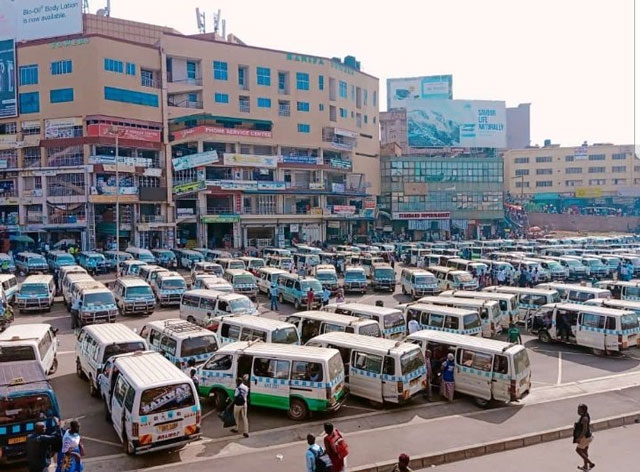Taxi and bus operators plying different routes countrywide have announced they will increase transport fares over rising fuel prices.
Fuel prices remain high, three months after government assured Ugandans of stability. A litre of petrol now goes for between Shs5,000 and Shs5,500 while that of diesel is at Shs5000.
Uganda Taxi Operators’ Federation (UTOF) officials says, they have approved new fares to be charged beginning next week.
The increment range between Shs500 and Shs1,000 for shorter distances within the city centre and the suburbs and Shs1,000 to Shs3,000 for long distances.
Mr Rashid Mugenyi Ssekandi, the chairperson of UTOF, while confirming the development, said: “We reached out to the Minister of Works and Transport, Gen Katumba Wamala, and he said government has no alternative to solve fuel increment. So as taxi operators, we are going to increase the transport fares.”
He said when the fuel prices stabilise they will revert to the old charges.
Mr Ssekandi said they are operating at a loss since their customers are accustomed to the old fares and do not take into consideration the high fuel prices.
“The number of passengers travelling has also reduced,” he said.
The chairperson of Kisenyi and Namayiba bus terminal, Mr Nelson Ssekandi, said their association of bus operators has called for an emergency meeting next week to discuss fares. “We will engage stakeholders to come up with a way forward,” said Mr Ssekandi.
By yesterday, several buses were seen parked around the bus park.
“Buses that move across East Africa have increased their price. For example they have been charging Shs120, 000 from Kampala to Nairobi, but it has increased to now between Shs180, 000 and 200,000. South Sudan charges are now Shs200,000 from Shs150,000,” he noted.
“And since passengers cannot afford the new fares across East Africa, they have now resorted to transporting cargo,” Mr Ssekandi revealed.
He appealed to government to revise the prices of fuel.
“We had almost 60 bus companies and now there are only 45 that are fully operational,” he said.
Mr Ssekandi also revealed that some bus employees have lost jobs. “Shops within the bus terminals have also closed because there is no business,” he said.
Ms Christine Namakunda, the manager of Wanagon Coaches, said: “It’s hard to remain operational, the cost of running our businesses is too high.”
No endorsement yet
The Senior Public relations officer at the Ministry of Works and Transport, Ms Suzan Kataike, said the ministry has not yet endorsed the proposal of hiking transport fare.
“We requested them to submit their proposals. It is only after they have presented the proposals that the ministry will be able to assess and come up with an agreeable position,’’ Ms Kataike noted.
Responding to people’s call on the government to intervene, Ms Kataike said the ministry is waiting for the Cabinet decision on the escalating prices of commodities.
‘’Last week, the President said Cabinet is going to sit and discuss the matter,’’ she said.
Stage Old fare (Shs) New fare
Nsangi 3,000 4,000
Mpigi 5,000 6,000
Nansana 2,500 3,500
Kakiri 3,500 4,500
Busunju 6,000 7,000
Kasubi 1,500 2,500
Kayunga 8,000 9,000
Nakifuma 6,000 7,000
Kangulumira 10,000 11,000
Kawempe 2,000 3,000
Matugga 3,000 4,000
Mukono 4,000 5,000
Luzira 1,500 2,500
Entebbe 4,000 5,000
Kansanga 1,000 2,000
Ggaba 1,500 2,500
Mpererwe 3,000 4,000
Gayaza 3000 4000
Kalerwe 1,000 2,000
Ntinda 2,000 3,000
Luweero 7,000 8,000
Mityana 8,000 9,000
Mubende 15,000 16,000
Byeyogerere 2,000 3,000
Tororo 20,000 25,000
Pallisa 18,000 23,000
Mbale 20,000 25,000
Kamuli 15,000 16,000
Iganga 13,000 18,000
Jinja 10,000 15,000
Mbarara 30,000 35,000
Hoima 20,000 25,000
Masaka 15,000 20,000
Busembatia 20,000 25,000
Namutumba 20,000 25,000
Bukedea 25,000 30,000
Mbale city 25,000 30,000
Bugiri 16,000 21,000
Masaka city 14,000 19,000
Kalisizo Kyotera 18,000 23,000
Rakai 20,000 25,000
Mutukula 25,000 30,000
Rwamagwa 25,000 30,000
Lyantonde 20,000 25,000
Kyazanga 20,000 25,000
Mbirizi 20,000 25,000
Kinoni 17,000 22,000
![]()
























